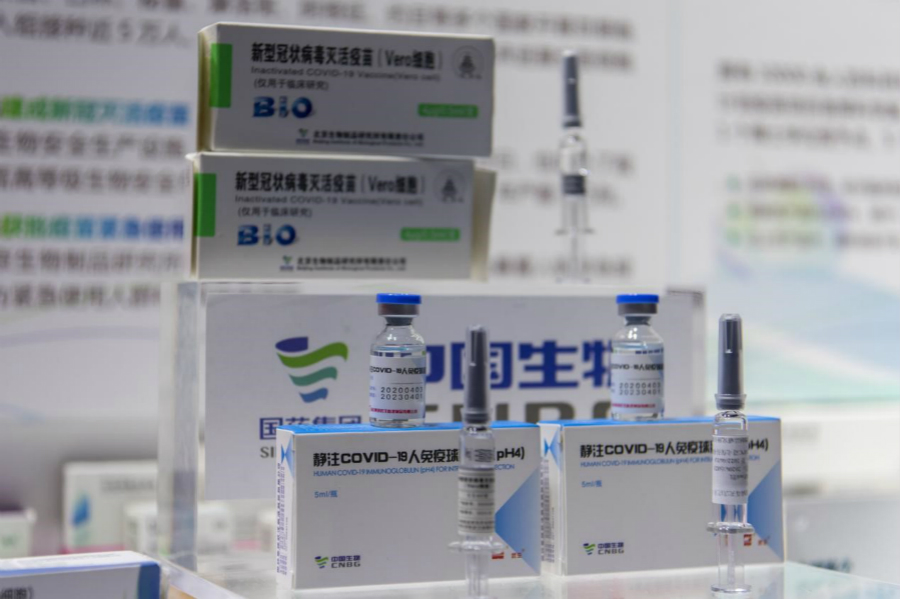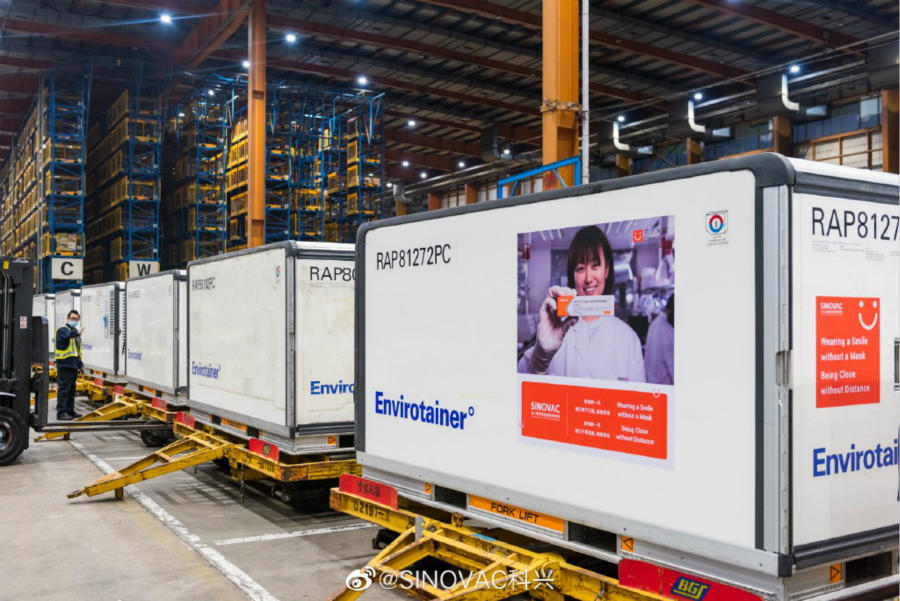Chinese COVID-19 vaccines are becoming global public good
As it promised last year, China is turning its COVID-19 vaccines into a global public good, contributing to ensuring vaccine accessibility and affordability in developing countries.
The country has granted conditional marketing authorization for its first self-developed COVID-19 vaccine. Its several other vaccines for COVID-19 are currently undergoing phase-3 clinical trials in many foreign countries. At present, Chinese vaccines are winning recognition, orders, and users from more and more countries.

Photo taken on Sept. 6, 2020, at the special area for public health and epidemic prevention of the 2020 China International Fair for Trade in Services shows inactivated COVID-19 vaccines developed by China National Pharmaceutical Group (Sinopharm). [People's Daily Online/Weng Qiyu]
On Jan. 2, Egypt granted official permission for emergency use of inactivated COVID-19 vaccine developed by China National Pharmaceutical Group (Sinopharm), and decided to purchase 40 million doses of COVID-19 vaccine from China.
Thailand announced on Jan. 3 that it had signed an agreement for purchasing two million doses of COVID-19 vaccine from Chinese pharmaceutical company Sinovac Biotech Ltd. (Sinovac).
On Jan. 6, Peru said that it had reached a purchase agreement with Sinopharm, and that the first one million doses of COVID-19 vaccine would arrive in the country this month.
On the same day, Indonesian President Joko Widodo announced that the country had received three million doses of COVID-19 vaccine it purchased from Sinovac and had started to distribute the vaccine across the country.
Seychelles President Wavel Ramkalawan received his first shot of COVID-19 vaccine from Sinopharm on Jan. 10, and urged all people in the country to get the injection.
As the COVID-19 pandemic is still causing havoc throughout the world, vaccines play a critical role in humanity's efforts to secure a complete victory against the virus.
The World Health Organization (WHO) Director-General Tedros Adhanom Ghebreyesus warned at a WHO press briefing on Monday that the number of confirmed COVID-19 cases was going to reach 100 million this week.

Photo taken on Nov. 15, 2020, shows a batch of COVID-19 vaccine produced by Chinese pharmaceutical company Sinovac Biotech Ltd. is ready to leave Beijing Capital International Airport for Brazil. [Photo/Official Sina Weibo account of Sinovac]
Quoting two latest reports, the WHO chief pointed out that the COVID-19 pandemic has caused global losses equivalent to several trillion U.S. dollars, and that the world would have to face not only a catastrophic moral failure, but also an economic failure if equitable access to COVID-19 vaccines could not be ensured.
China signed an agreement with the Global Alliance for Vaccines and Immunisation (GAVI) on Oct. 8, 2020, officially joining the COVID-19 Vaccines Global Access (COVAX), an initiative that aims to accelerate the development and manufacturing of vaccines for the COVID-19 and ensure that every country enjoys equitable access to the vaccines.
The initiative intends to provide two billion doses of COVID-19 vaccines for higher-income self-financing countries and lower-income funded nations by the end of 2021.
"Even though China is leading the world with several vaccines in advanced stages of R&D and with ample production capacity, it still decided to join COVAX. We are taking this concrete step to ensure equitable distribution of vaccines, especially to developing countries, and hope more capable countries will also join and support COVAX," said Chinese Foreign Ministry's spokesperson Hua Chunying at a press conference.
Joining COVAX represents an important step China has taken to uphold the concept of a shared community of health for all and to honor its commitment to turn COVID-19 vaccines into a global public good, Hua noted.
"Once the Chinese COVID-19 vaccines are developed and put into use, China will fulfill its commitment to make the vaccines global public goods and provide them to the world at a fair and reasonable price," said Shen Bo, deputy director-general of the Department of International Organizations and Conferences of the Foreign Ministry, at a press conference held on Dec. 31, 2020.
China has always attached importance to the accessibility and affordability of COVID-19 vaccines in developing countries, Shen said, adding that China has considered providing vaccines to developing countries in various ways, including donations and free aid.
China National Biotec Group (CNBG) affiliated with Sinopharm has established two high-grade biosafety workshops for producing inactivated COVID-19 vaccine in central China's Wuhan and China's capital city Beijing. Both workshops have started large-scale production of the vaccine.
Sinopharm would be able to produce nearly 100 million doses of COVID-19 vaccine by the end of 2020, according to Liu Jingzhen, chairman of Sinopharm, noting that the group's production capacity would probably surpass 1 billion doses in 2021.
Sinovac's first inactivated COVID-19 vaccine production line completed and put into use last August has an annual production capacity of around 500 million doses, and the company's second production line for the vaccine is ready to be put into service soon, said Yin Weidong, chairman and CEO of the company.
Sinovac is capable of producing one billion doses of COVID-19 vaccine per year, thus guaranteeing supplies of vaccine for 500 million people (two doses per person), Yin said, adding that production of relevant products in the company is in full swing 24 hours a day.
At present, 18 enterprises in China have started to build up their production capacity of COVID-19 vaccine, according to Mao Junfeng, an official from China's Ministry of Industry and Information Technology (MIIT).
It's believed that with further improving production capacity of the vaccine, China will be able to meet the domestic demand for large-scale vaccination while contributing to the global fight against the pandemic by making its vaccines a global public good, Mao noted.
























